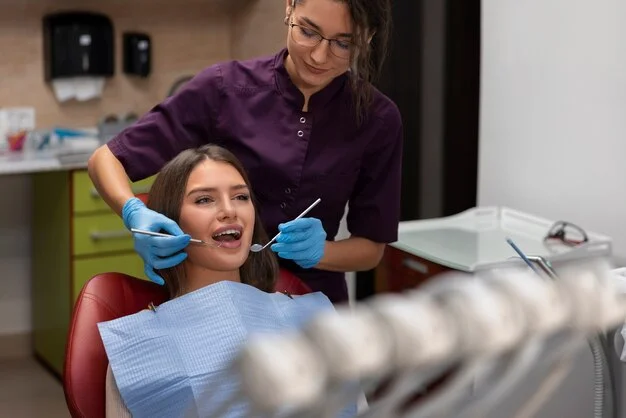Ask Ayurvedic doctor a question and get a consultation online on the problem of your concern in a free or paid mode. More than 2,000 experienced doctors work and wait for your questions on our site and help users to solve their health problems every day.
Ayurvedic Treatment for Teeth and Gums: Natural Oral Care Solutions

Introduction to Ayurvedic Treatment for Teeth and Gums
Ayurveda offers a holistic approach to maintaining oral health, focusing on natural remedies, proper hygiene, and balance among the doshas to promote healthy teeth and gums. Ayurvedic treatments for teeth and gums emphasize preventive care, detoxification, and the use of herbal formulations to strengthen dental structures, reduce inflammation, and prevent infections. By integrating daily oral care routines with Ayurvedic principles, individuals can achieve a healthy mouth and overall wellness.
Historical Roots & Ayurvedic Significance
In ancient Ayurvedic texts, oral health was considered an essential part of overall well-being. The mouth is viewed as a gateway to the body, where imbalances can lead to systemic issues. Classical Ayurvedic literature outlines various treatments for dental problems, gum diseases, and bad breath, emphasizing the importance of maintaining balance between the doshas—Vata, Pitta, and Kapha—to ensure healthy teeth and gums. These time-tested practices highlight the significance of herbal remedies, diet, and lifestyle in preventing and treating oral disorders.
Key Ayurvedic Approaches for Oral Health
1. Herbal Remedies & Natural Formulations
Ayurveda utilizes a range of herbs and natural ingredients to support teeth and gum health:
- Neem (Azadirachta indica): Known for its antibacterial and anti-inflammatory properties, neem is used as a toothpaste or mouthwash to combat plaque, gum inflammation, and bad breath.
- Clove (Syzygium aromaticum): Clove oil is applied to relieve toothache, reduce inflammation, and fight infection due to its analgesic and antiseptic properties.
- Licorice (Glycyrrhiza glabra): Licorice root has antimicrobial effects that help prevent cavities and gum disease.
- Turmeric (Curcuma longa): Turmeric paste or mouth rinse reduces inflammation, fights infection, and promotes healing of gums.
These herbs can be applied directly to the gums, used in toothpaste formulations, or prepared as mouthwashes.
2. Ayurvedic Oral Hygiene Practices
- Tongue Scraping: Regularly scraping the tongue removes toxins and bacteria that cause bad breath and oral infections.
- Oil Pulling: Swishing oil (such as sesame or coconut) in the mouth for 10-15 minutes can reduce harmful bacteria, improve gum health, and whiten teeth.
- Brushing with Herbal Powders: Using powders made from neem, clove, or other herbs instead of conventional toothpaste supports balanced oral flora and reduces plaque.
3. Dietary Recommendations
A diet that supports oral health in Ayurveda includes:
- Cooling Foods: To balance Pitta in the mouth, consume cooling foods like cucumbers, melons, and coconut.
- Avoid Excessive Sugar and Acidic Foods: These can lead to tooth decay and gum inflammation.
- Hydration: Drinking warm water or herbal teas supports overall hydration and saliva production, crucial for maintaining oral health.
4. Lifestyle Adjustments & Detoxification
- Stress Management: Practices such as meditation and pranayama can reduce stress, which often contributes to teeth grinding (bruxism) and gum disease.
- Regular Detoxification: Panchakarma therapies help eliminate toxins (Ama) from the body, which may indirectly benefit oral health by reducing systemic inflammation.
How Ayurvedic Treatment Works for Teeth and Gums
Ayurvedic treatment for oral health works by addressing underlying doshic imbalances and root causes of dental issues. Herbal remedies with antibacterial, anti-inflammatory, and analgesic properties help treat infections, reduce inflammation, and prevent decay. Oral hygiene practices such as oil pulling and tongue scraping remove toxins and support a healthy oral microbiome. Combined, these approaches not only treat existing issues but also prevent future dental problems by strengthening the immune system, balancing doshas, and promoting holistic well-being.
Potential Side Effects & Precautions
- Allergic Reactions: Some individuals may be sensitive to certain herbs like neem or clove. Always perform a patch test or consult with a healthcare provider before widespread use.
- Proper Technique: Follow correct techniques for tongue scraping and oil pulling to avoid potential irritation or gagging.
- Consultation: For severe dental issues, consult with a qualified Ayurvedic practitioner or dentist to develop a comprehensive treatment plan that may complement conventional care.
Frequently Asked Questions (FAQ)
What are the benefits of using neem for oral health?
Neem has antibacterial, antifungal, and anti-inflammatory properties that help reduce plaque, prevent gum disease, and combat bad breath.
How does oil pulling improve oral health?
Oil pulling removes harmful bacteria from the mouth, reduces plaque buildup, soothes inflamed gums, and can lead to whiter teeth when practiced regularly.
Can Ayurvedic remedies replace dental visits?
While Ayurvedic practices can greatly improve oral health and prevent many issues, they are not a substitute for professional dental care. Regular check-ups and procedures by a dentist are important for comprehensive oral health.
How often should I practice tongue scraping?
Tongue scraping can be done daily, preferably in the morning before eating or drinking, to remove toxins and bacteria accumulated overnight.
Is oil pulling safe for everyone?
Oil pulling is generally safe for most people. However, those with latex allergies should avoid oils that may contain latex, and care should be taken not to swallow the oil.
Conclusion & Expert Insights
Ayurvedic treatment for teeth and gums offers a holistic approach to oral health by combining herbal remedies, traditional hygiene practices, dietary guidance, and lifestyle adjustments. These methods not only address existing dental issues but also contribute to prevention and long-term oral wellness. By balancing the doshas, detoxifying the body, and supporting the immune system, Ayurveda provides natural and gentle solutions for maintaining healthy teeth and gums. Working with a qualified Ayurvedic practitioner can personalize these approaches, ensuring safe and effective integration into your daily oral care routine.
References & Further Reading
-
Lad, V. (1984). Ayurveda: The Science of Self-Healing. Lotus Press.
- Frawley, D. (1999). Ayurvedic Healing: A Comprehensive Guide. Lotus Press.
- National Institute of Ayurveda. Retrieved from

